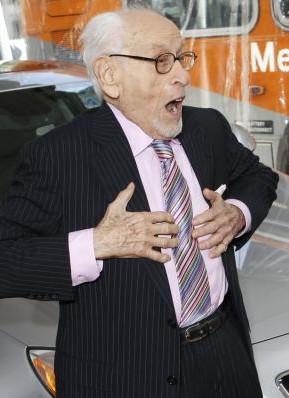Remarkable Men: The Charm and Talents of Wallach and Ajami
By • June 30, 2014 0 1034

We lost two remarkable and gifted men in the last week: one a scholar, a charismatic, often lyrical, interpreter, celebrator and regretful critic of the Arab world; the other an exuberant, multi-gifted actor who was at home in both spaghetti westerns and the plays of Tennessee Williams.
We lost Fouad Ajami to cancer at the age of 68, and Eli Wallach at 98.
FOUAD AJAMI—Ajami was born in a small Lebanese village but grew up in Beirut and was, with all of his passionate connection to Middle Eastern history and culture, a citizen of the world and the United States, specifically, where he gained citizenship. Growing up in Beirut—once called the Paris of the Middle East—and Lebanon perhaps gave him the grounding for a generous, sometimes divided spirit, and made him a gifted interpreter of the deeply rooted and passionately held cultural and political strains of a diverse array of Middle Eastern countries.
As an academic, but also as a writer of historical and contemporary books on the Middle East and its relationship to the west, Ajami wrote with a literary gift and keen political analysis about the region in such books as “The Dream Palace of the Arabs: A Generation’s Odyssey,” “The Arab Predicament: Arab Political Thought and Practice Since 1967,” and, most recently, “The Syrian Rebellion” and “Crosswinds: The Way of Saudi Arabia.”
Ajami became a familiar face during the first Gulf War and especially in the post-September-11 world on television, on CNN, PBS and CBS, talking about the complexities of the region, about the plight of the Palestinians and about the need for peacemaking. He was also a keen advocate of the U.S. war in Iraq, becoming closely involved as a kind of advisor to the likes of Condoleezza Rice and Paul Wolfowitz, the foreign policy intellectuals in the administration of President George W. Bush. He predicted, as did others, that Iraq would welcome the Americans. Recent events, among other things, have borne out neither that prediction nor the idea of an eventual outcome of stability in Iraq after the end of Saddam Hussein.
He abhorred Arab dictators and, after initial elation, was saddened by the results of the Arab Spring, especially in Syria and Egypt. Right or wrong—and he was more often right—he wrote about the Middle East with courage, with a poet’s emotion, with an intellectual’s sharp analysis and without malice.
Ajami’s gifts were to look at the world in which he was raised, with compassion that did not offend credulity. He carried himself often oozing bright charm , a pleasant charisma which came across as authoritative on television and with great impact in person. His friendships were not limited by religion, ethnicity or nation.
ELI WALLACH—Eli Wallach was 98 when he died this week, a son of Brooklyn and Jewish parents who did not entirely approve when their son decided to become an actor.
He became an astonishingly good actor—minus movie star looks—but fueled by Method acting, imagination and a gift for making very bad people appear very interesting. His life, which he shared with his wife fellow actress Anne Jackson for decades, was rich in parts, 150 roles scattered across theater, Broadway, television and films.
Wallach said that his popular film work supported his and his wife’s theater passion, which may be true, since he was acclaimed for his work by such playwrights as Tennessee Williams, Murray Schisgal and Eugene Ionesco. He and Jackson were often teamed up and were considered outstanding interpreters of Schisgal’s brand of middle-class urban angst as displayed in dysfunctional marriages, which they displayed in Schisgal’s hit play, “Luv”.
Like it or not, however, Wallach, with his raspy voice, his intense gaze, his fiery acting, will probably be most remembered for roles which he chewed up and spit out like a carny act. That would be the bandit leader in “The Magnificent Seven,” opposite Yul Brynner and Steve McQueen, and in “The Good, the Bad and the Ugly,” an epic Sergio Leone spaghetti western, in which he was both the bad and the ugly part.
A number of years ago, when Wallach and Jackson were co-starring in the comedy “The Nest of the Woodgrouse” at the Kennedy Center, the Georgetowner met the couple for lunch at Nathan’s Restaurant. We got a chance to see and feel Wallach’s natural gift for story-telling. He spellbound the table with touching, almost elegiac, memories of time spent in the making of “The Misfits,” which had in its cast Clark Gable, Marilyn Monroe, Montgomery Clift, Thelma Ritter and Wallach. John Huston directed a famously dramatic set, what with Arthur Miller, who had written the script for Monroe, on set, the fragile Clift barely hanging on, Monroe often struggling and battling with Miller. “She had a way about her,” Wallach said. “She was very sweet even when she had problems. That was an experience you’ll never forget.” At the time, Wallach was the only survivor of the movie. In the aftermath, Gable suffered a fatal heart attack, Clift died and Monroe followed soon after. It was the last film for all three.
Wallach recalled then the impact of “The Magnificent Seven.” “Unbelievable,” he said. “I was famous. I walked into my bank some time after the movie opened, and the teller greeted me with ‘You came back. Why?’” Those were the dying words of the bandit leader, played by Wallach, after Brynner’s all-in-black hero had gunned him down.
Even in his old age, Wallach continued to work. He played the memorable, double-crossing and candy-loving don in the last “Godfather” film. He performed most recently in Oliver Stone’s sequel “Wall Street: Money Never Sleeps.” In 2010, Wallach received an Honorary Oscar for Lifetime Achievement.

